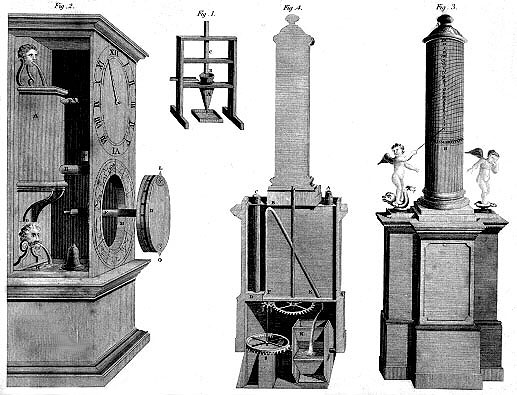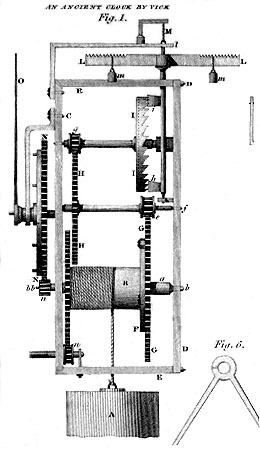First Clocks
Today, we look for the first clocks. The University of Houston's College of Engineering presents this series about the machines that make our civilization run, and the people whose ingenuity created them.
When was the mechanical clock invented? It's a hard question -- not because people wrote too little about early clocks, but because they wrote the wrong things. The problem is that the mechanical clock seemed at first to be a mere improvement on the older water clock, which had been around for well over a thousand years. The existing records ignore working details, so it's hard to tell when the changeover took place.
The water clock used a steady regulated flow of water into a vertical tank. The rising water level in the tank indicated the time of day. That all sounds simple enough, but water clocks were large ornate structures with a lot of supporting gear work and general fancification. Like the later mechanical clocks, they often tolled the hours on bells, for example.
Mechanical clocks differed by using an escapement mechanism to regulate time. The balance wheel on a watch or the pendulum on a grandfather's clock is an escapement -- a mechanism that ticks in a steady rhythm and lets the gears move forward at a steady rate in little equal jumps.
The first escapement we know about was described in AD 1250 by the French engineer Villard de Honnecourt; but it wasn't used to control a clock. Instead, it was used in a cute little gadget that steadily pointed at the sun while it moved through the daytime sky.
Monastery records after 1250, for the next hundred years, refer to clock bells, to gearing, to clock towers. But clock terminology rode right through the changeover. The first clear drawing of a mechanical clock was given us by Jacopo di Dondi and his son in 1364, and they'd probably been building them for at least 20 years by then. We can't be sure, but the first mechanical clock was probably made in the late 1200s.
It's strange that such an earth-shattering change could be that invisible. Water clock inaccuracies had bottomed out at around 15 minutes a day, and that's about as well as the first mechanical clocks did. But now, suddenly, engineers began to cut that error in half every 30 years, right up into the 20th century. It wasn't long before mechanical clocks swept the imagination of the Western world and led to new standards of precision -- first in instruments and ultimately in thought itself.
The most important technology of an age might not be the most obvious one. Great changes sometimes come in on little cat feet. And that's what the mechanical clock did in the thirteenth century.
I'm John Lienhard, at the University of Houston, where we're interested in the way inventive minds work.
(Theme music)
Usher, A. P., A History of Mechanical Inventions. London: Oxford University Press, 1929, 1954, 1970, Chapter 7.
This episode has been greatly revised as Episode 1506.

(From the 1832 Edinburgh Encyclopaedia)
Details of clepsydrae (or water clock) operation

(From the 1832 Edinburgh Encyclopaedia)
A very early foliot and verge escapement mechanism